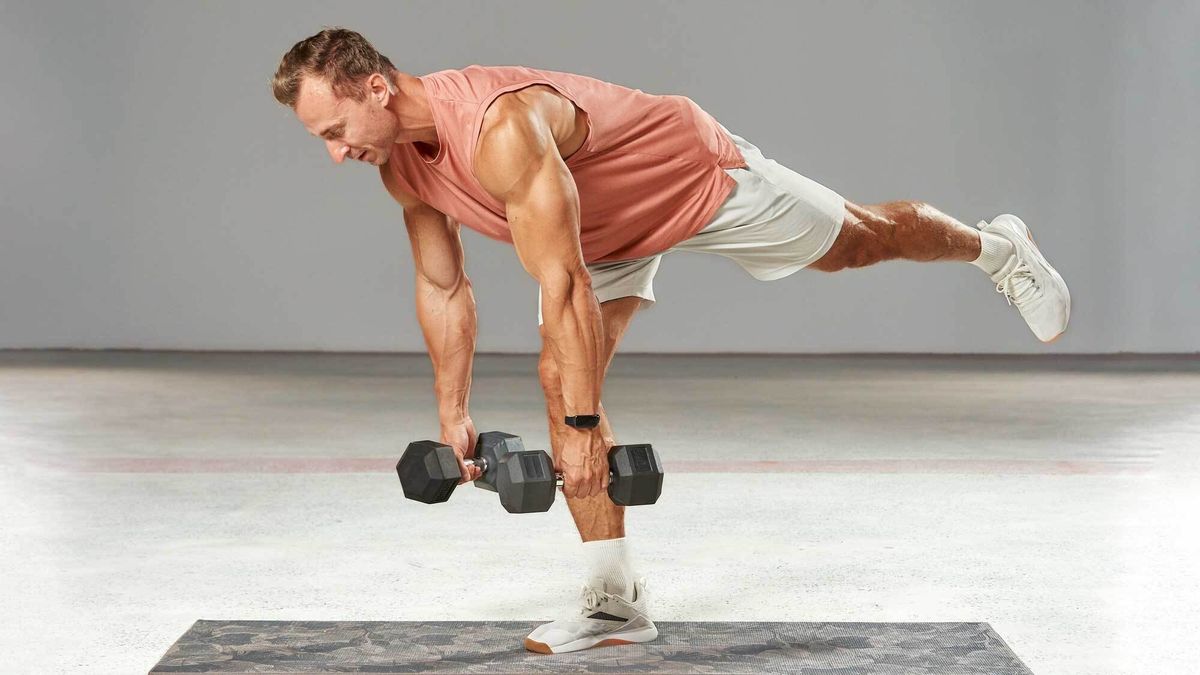A little strength training goes a long way as a runner, and if you’re able to add one or two workouts to your weekly schedule, the benefits can include improved performance and a lower risk of injury.
It’s not always easy to do this, I admit. I can usually find time to run 50-70 miles a week, yet often struggle to summon the motivation to do even one 30-minute strength session.
Having a good workout to follow that I know is effective and can do at home certainly helps to get me moving, and this 35-minute dumbbell workout fits the bill. You need a set of dumbbells or the best adjustable dumbbells for the workout, along with a bench or stool you can step onto and support your legs on for some exercises.
The routine was designed by YouTube fitness trainer Marie Steffen, and she uses two 11lb dumbbells for reference, and lighter weights are the way to go because you’ll be testing your balance as well as your strength with most exercises, which is where adjustable dumbbells come in handy.
Watch Marie Steffen’s dumbbell workout for runners
The workout includes both a warm up and cool down as part of the 35 minutes. After the warm up you do four supersets of two moves, one leg exercise and one core exercise. Then you go into drop sets of the Bulgarian split squat before a core-focused finisher.
It’s a well-rounded session that focuses on the leg and core exercises runners need, but really it’s a good workout for anyone. I gave the workout a go one lunchtime to see what it could do for my running; here are my main takeaways.
You mostly do unilateral exercises
Unilateral exercises like single leg deadlifts or squats work one side of the body at a time and are useful for runners, since you only ever have one leg on the ground at a time when running. Unilateral moves can also help you identify if one side of your body is weaker than the other, and then address that imbalance.
Most of the moves in Steffen’s workout are unilateral exercises, and while that does mean you need to use lighter weights that you might do when doing bilateral moves, it’s handy for runners trying to target one leg or side of the body at a time.
It’s a complex workout
The work and rest periods change throughout the workout and you move from doing supersets to drop sets and then a finisher, all of which might be new concepts to you — I hadn’t done drop sets in the past myself, for instance.
And even though you just have to follow Steffen’s on-screen instructions, it’s a it’s a harder workout to follow than a simple circuit session. Runners looking for something simpler to add to their routine could try this six-move dumbbell session instead.
Scan the video before you start
The rest periods are short in the workout — usually you only get 5 or 10 seconds break between moves — and you often have to change your position entirely in that time, sometimes grabbing a bench to lean on or step onto for the next exercise.
I went into the workout without checking and was often scrambling to get into position for each move, or having to pause the video. I’d recommend scanning through the workout quickly before you start to make sure you have the kit you need to hand and that you’re prepared for the fast transitions between moves.
The workout tests your balance and stability
Many of the leg exercises you do in the workout involve balancing on one leg at points, and the session will certainly help to improve your stability. I noticed that I had more trouble doing moves like single-leg deadlifts and step-ups on my left leg than my right, and plan to target my left side more in the future to address that imbalance.
It’s important to move slowly and with control during these exercises too, because otherwise you’ll lose your balance and won’t be able to complete the move properly. If you can’t complete the set without toppling over, reduce the weight you’re using and the speed you’re moving at.
I’ll be doing more drop sets
In the second half of the workout you do a drop set of Bulgarian split squats on each leg. For this you work for 30 seconds with two dumbbells, then 30 seconds with one dumbbell, then 30 seconds of bodyweight squats.
I found it a great way to push through 90 seconds of a challenging move on each leg, and I’m keen to do more drop sets in the future. For more traditional drop sets you would work until exhaustion before reducing the weight and carrying on until you can do no more reps, but this timed version is also worth trying.
I added more calf raises
No strength workout for runners is complete without some calf raises, and although you do some as part of a combination move with goblet squats in Steffen’s session, I felt it was worth adding some more on at the end because the calf is so important in running. I usually do single-leg calf raises on the edge of a step, doing three sets of 10 reps on each side.











